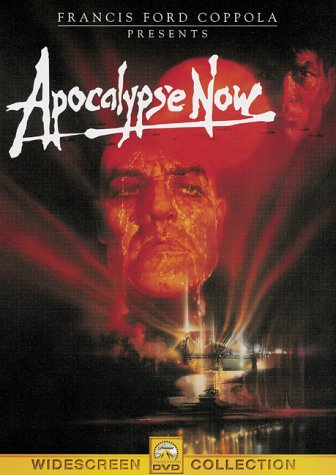Apocalypse Now

Apocalypse Now | ||
 |
Director: | Francis Ford Coppola | Actors: | Marlon Brando (as Col. Walter E. Kurtz), Robert Duvall (as Lt. Colonel William 'Bill' Kilgore), Martin Sheen (as Capt. Benjamin L. Willard), Frederic Forrest (as Engineman 2nd Class (EN2) Jay Hicks/'Chef'), Albert Hall (I) (as Chief Quartermaster (QMC) Phillips), Sam Bottoms (as Gunner's Mate 3rd Class (GM3) Lance B. Johnson), Laurence Fishburne (as Gunner's Mate 3rd Class (GM3) Tyrone Miller/'Mr. Clean' (as Larry Fishburne)), Dennis Hopper (as Photo Journalist), G.D. Spradlin (as General R. Corman), Harrison Ford (as Colonel G. Lucas), Jerry Ziesmer (as Civilian (Jerry)), Scott Glenn (as Captain Richard Colby), Bo Byers (as Sergeant MP #1), James Keane (I) (as Kilgore's Gunner), Kerry Rossall (as Mike from San Diego) | Country: | USA | Category: | Action | Year: | 1979 |
| Description: | Captain Willard (Martin Sheen), whose mission is "Terminate with extreme prejudice", receives orders to seek out a renegade military outpost led by a mysterious Colonel Kurtz (Brando) during the Vietnam war. | Comments: | "Apocalypse Now" shows that something can be a great film and pretentious drivel at the same time. That is to say, it demonstrates the possibility of being both, without itself quite being either. There are some magnificently realised scenes, such as could be PART of a masterpiece, but in the end - when Coppola has run out of river, so to speak - the movie goes nowhere, because it has nowhere to go. And let's face it: the man, for all his virtues as a director, in the 1970s at least, can't generate more than the minimal amount of tension needed to keep his film going, to save his life. Spoilers follow... There are two mysteries regarding Colonel Kurtz: one, why he went insane, and two, why - given that the other commanders in Vietnam are guilty of bloody atrocities, too, and that the whole POINT of the war is to destroy - the higher-ups want to have him killed. The answer to the first question is clear enough. If we hadn't got it already, it's answered in the last really strong scene, when we see the patrol boat stop a civilian river boat and machine-guns the occupants (who, it turns out, are NOT smuggling weapons downriver at all). The wounds sustained by the woman on the boat are not fatal and when the shooting's over the pilot of the patrol boat starts talking about handing her over to the nearest group of "friendly" civilians for medical aid. Captain Willard is frustrated with the hypocrisy and simply shoots the woman. This is WHY Kurtz went insane (and it's clear enough why Willard would react to the same situation in much the same way; he works, remember, for the CIA). But why do his superiors care? Why do his superiors want him out of the way, when he's after all doing what they're doing and what they seem to want him to do? Maybe there's a good answer - maybe, for instance, they want Kurtz to die DURING the war, so that he won't be an embarrassment afterwards. But this is just a guess based on no particular evidence presented to us during the movie; and I don't like this answer much, anyway. (What's one embarrassment among many?) The point is, when a film sets something up as an intriguing mystery, it should at least have an answer in mind. The main trouble with Kurtz as a character and plot device is that he's simply a swamp at the end of the river, something for the narrative to get mired in and never emerge. Even so, it was a pity about Marlon Brando. Coppola should certainly have cast a more convincing actor, one who wouldn't, in Danny Peary's words, "contemplate the universe before delivering each line", but it was an added misfortune that Brando simply refused to co-operate, and that Coppola had to edit the footage to remove as much of Brando's presence as he decently could. Two of Coppola's technological choices deserve comment. He was absolutely right to shoot in Technicolor; indeed, every single aspect of the way the film was shot, was absolutely right. The vivid colours and endlessly rich detail, even the luscious beauty, only make the horror more horrifying. But he was absolutely wrong to use synthesisers to play the musical score. The music undoes a small part of the cinematography's good work (in addition to dating the movie badly). They should have used real instruments - ANY real instruments. The only use of music that really works is when a recording of Wagner cuts through the rest of the soundtrack, just before American helicopters raid and strafe a Vietnamese village. |
Languages: | English | Subtitles: | Length: | 153 | Video format: | Audio format: | Resolution: | Files sizes: | 1466 |